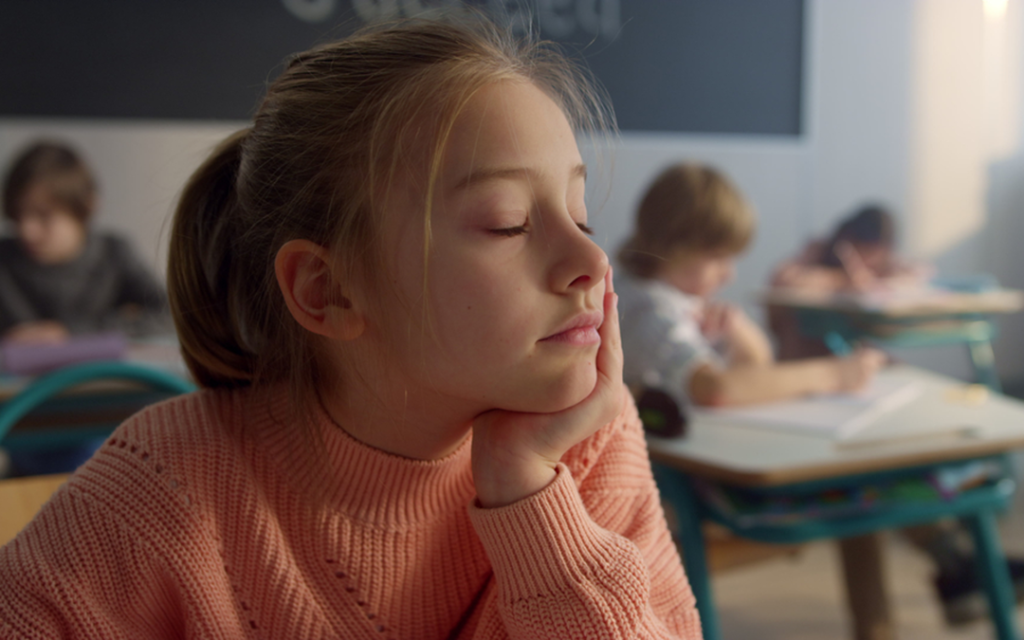
Have you ever tossed a stone into a still pond? The stillness is rumpled. The tranquility is broken. Human awareness is like this, too; it doesn’t take much to shatter our attention. Whether it is a car horn, phone notification, doorbell, TikTok dance, or a clever commercial, human senses are drawn toward distractions. In today’s world, distractions abound—and they lure us out of focus.
Streaming services, the pressures of school, social opportunities, and the general hustle of existence send constant ripples across the pond. Students seldom experience their mental awareness as a smooth surface. Mindfulness offers a way to quiet the waves in a noisy world. Let’s explore the benefits of taking a few short moments out of the day to enjoy tranquility.
Calming the Chaos
When discussing mindfulness, people often talk about breathing exercises, guided meditation, or simply getting up and walking outside. Techniques differ, but the goal is to slow down, experience calm, and focus on the present, like pulling over during a long drive to gaze at an incredible sunset. For students also, mindfulness spotlights the immediate surroundings and reminds them of the little wonders.
The George Lucas Educational Foundation suggests several ways students can apply mindfulness to impact their lives positively. Students’ lives are often routine driven—the bus stop, the bell schedule, practice, a music lesson, part-time job, dinnertime, and bedtime. They might use this to plan mindfulness exercises into their particular daily routine, such as practicing breathing techniques at their locker or engaging in short meditation sessions on the bus. These help reduce stress levels and improve focus, which is crucial for academic success. Secondly, students can participate in mindfulness programs or groups like the one mentioned in the article (NüYü), where they learn about stress management and healthy coping strategies. Engaging in these programs often leads to a better understanding of personal stressors and effective ways to manage them. Thirdly, students can apply mindfulness to academics by allotting a set amount of time before study sessions to improve their performance. The article indicates that mindfulness practices have been linked to higher levels of attention, better retention, and improved grades in subjects like math. Fourthly, mindfulness can be particularly beneficial for students dealing with external stressors such as divorce, troubled friendships, or financial hardship. It offers a way to cope with and reduce the impact of these stressors on their mental well-being. Finally, students can embrace mindfulness practices like S.T.O.P. and the Kindness Curriculum, incorporating empathy and gratitude exercises, improving academic outcomes, and fostering emotional intelligence and social skills.
Integrating Mindfulness into Daily Routines
Alongside systematically implementing some of the above techniques, students can employ mindfulness by avoiding multitasking and taking planned breaks from work to experience simple joy. Stepping away into simple, sustained pleasures helps students to establish calm routines and improve overall performance. The Journal of Food Science Education recommends these strategies to help students improve their focus, learning efficiency, and overall academic performance:
- Focus on One Task: To enhance learning efficiency, emphasize unitasking over multitasking during study sessions.
- Increase Self-Awareness: Become aware of how distractions affect learning and use apps or journals to monitor and adjust habits.
- Use Cognitive Control Techniques: Apply strategies like the Pomodoro Technique and regular physical exercise to improve concentration and manage distractions.
- Set Goals and Prioritize: Clearly define personal academic goals (write them down!) and use time management methods like timeboxing to align daily activities with these goals.
- Mindful Technology Use: Utilize technology intentionally for learning and avoid its use for multitasking during study times.
Channeling the Chaos
When students are stressed or uncertain of themselves, they underperform. Mindfulness can help them carve the chaos into a clear action plan, creating a stable platform for growth. Research suggests that students can enhance their academic performance and resilience by incorporating mindfulness practices into their daily lives with three applications. Regular mindfulness activities, like the ones mentioned above, help students focus better and be more present, improving learning and memory. Mindfulness also aids in developing resilience, enabling students to cope with academic stress and challenges effectively and view obstacles and challenges as growth opportunities. In addition, mindfulness improves emotional competencies such as empathy, self-awareness, and emotional regulation, which are essential for positive interactions and handling the pressure of academic environments.
Childhood and adolescence are seasons brimming with joy, trial, change, and opportunity. By introducing and teaching these techniques to students, we can help them recognize the commotion within and learn valuable skills to cultivate clear and peaceful minds, enabling them to enjoy life and academics moment by moment.
About TLC
The Lincoln Center for Family and Youth (TLC) is a social enterprise company serving the Greater Philadelphia Area. Among its five divisions, TLC offers School-based Staffing Solutions, Mobile Coaching and Counseling, and Heather’s Hope: A Center for Victims of Crime. These major programs are united under TLC’s mission to promote positive choices and cultivate meaningful connections through education, counseling, coaching, and consulting.
